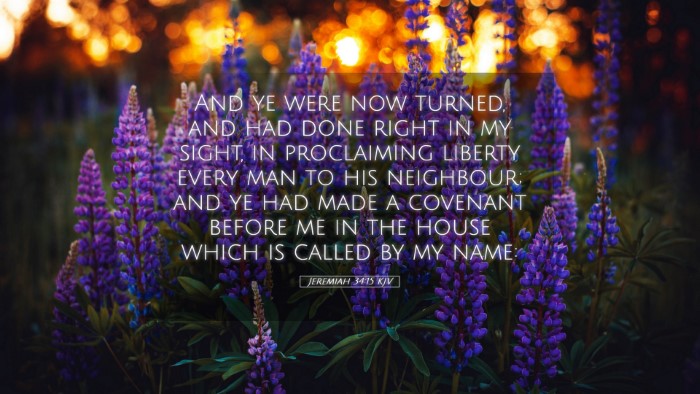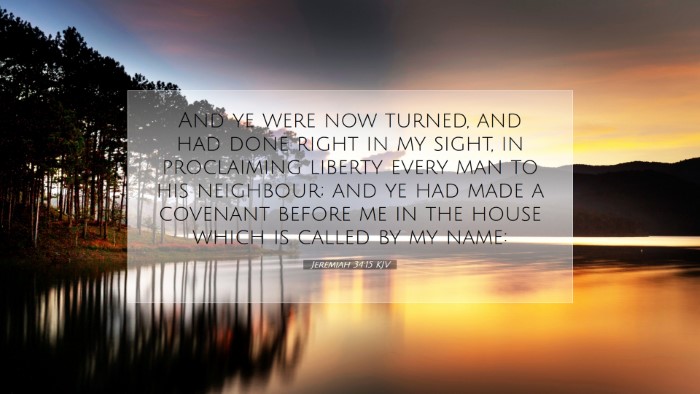Bible Commentary on Jeremiah 34:15
Verse: Jeremiah 34:15 - "And you were now turned, and had done right in my sight, in proclaiming liberty every man to his neighbor; and you had made a covenant before me in the house which is called by my name:"
Contextual Background
This verse occurs within the larger narrative of Jeremiah's prophecies concerning the impending judgment of Jerusalem and its people due to their disobedience. In this chapter, God reminds the people of their responsibilities and the covenant they made before Him, particularly focusing on social justice and the liberation of the oppressed.
Exegesis
The phrase "you were now turned" indicates a brief moment of repentance among the people, demonstrating their recognition of their misdeeds. The act of proclaiming liberty refers to freeing their Hebrew slaves, which had been a directive that resonated with the Mosaic Law (Exodus 21:2; Leviticus 25:39-46). The people had initially committed to this liberty but were not steadfast in their covenant.
Commentary Insights
Matthew Henry's Commentary
Matthew Henry emphasizes the importance of the covenant made by the people of Judah. He notes that God sees the turning of their hearts as the initial steps towards restoration. Henry reflects on the deep moral implications of releasing captives, signifying a broader call to justice and mercy. He argues that God delights in acts of charity that reflect His nature.
Albert Barnes' Notes
Albert Barnes comments on the "liberty every man to his neighbor," interpreting this as a crucial aspect of social justice. He notes that the Hebrew context of servitude allowed for the redemption of slaves, and this verse served as a reminder that true faith manifests in ethical conduct. Barnes accentuates that honoring such a covenant before God is an act of obedience that reflects an understanding of God's justice.
Adam Clarke's Commentary
Adam Clarke provides a historical overview, indicating that the people had, for a brief period, returned to righteousness by following God's precept. Clarke points out the critical nature of their covenant, stressing that it wasn’t merely about releasing slaves; it was about realigning their lives with divine principles. He observes that this verse serves as a poignant reminder of the dangers of hypocrisy in worship and action.
Theological Implications
Jeremiah 34:15 carries significant theological weight, as it illustrates God’s demand for social justice as fundamental to covenant standing. The call for liberation resonates throughout Scripture, foreshadowing the liberating work of Christ. The importance of personal and communal repentance points to an ongoing need for reformation within the church today.
Applications for Today
- Understanding Covenantal Responsibilities: Believers are encouraged to reflect on their commitments before God and their communities. This verse reminds us that our faith must be active and reflected in how we treat others.
- Promoting Social Justice: The call to proclaim liberty is as relevant today as it was in Jeremiah’s time. The church is reminded to engage in acts that liberate the oppressed and stand against injustices.
- Repentance and Restoration: The passage highlights the power of turning back to God. Christians are encouraged to evaluate their lives regularly and seek restoration through repentance.
Conclusion
Jeremiah 34:15 serves as an essential reminder of the need for righteousness and justice intertwined with our faith. Through the insights of Matthew Henry, Albert Barnes, and Adam Clarke, we gain a richer understanding of the text and its implications for our lives today. May we, like the people of Judah, return to a covenant relationship that honors God through action and genuine care for our neighbor.


